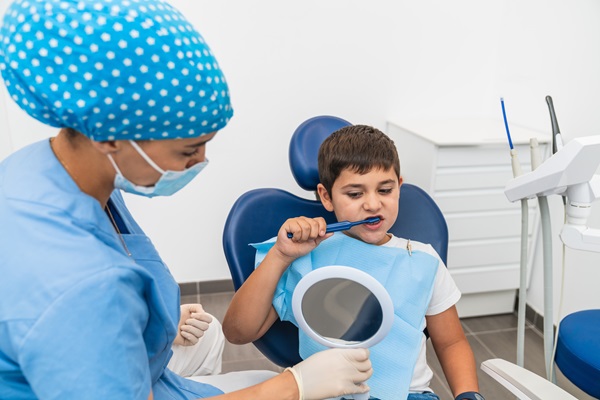Top Tips for Children’s Dental Care: What Parents Should Know

Maintaining good oral health is essential for children’s overall well-being and development. Establishing healthy dental habits early on can help prevent cavities, gum disease, and other oral health issues. Proper dental care for children requires a combination of regular visits to a pediatric dentist, healthy habits at home, and awareness of common dental concerns. Below are some top tips for parents to ensure their children receive the best possible dental care.
1. Start dental visits early
The American Academy of Pediatric Dentistry recommends that children have their first dental visit by their first birthday or within six months of the appearance of their first tooth. Early dental visits allow the dentist to monitor the development of the teeth and gums and provide guidance on caring for a young child's oral health.
Regular checkups help establish a positive relationship between the child and the dentist, making future visits less stressful. These appointments also offer opportunities to address parents' concerns about their child’s dental development.
2. Brush and floss daily
One of the most important aspects of children's dental care is establishing a daily brushing and flossing routine. Children should begin brushing as soon as their first tooth appears. For infants, parents can use a soft, damp cloth or a baby toothbrush to gently clean the teeth and gums. Once more teeth come in, we recommend a soft-bristled toothbrush and a small amount of fluoride toothpaste.
As children age, they should be encouraged to brush their teeth twice daily for at least two minutes. Flossing should begin as soon as two teeth touch each other. Teaching children to floss properly helps remove food particles and plaque between teeth, reducing the risk of cavities and gum disease.
3. Monitor diet and sugar intake
A child's diet plays a significant role in their dental health. Sugary foods and drinks, such as candy, soda, and even fruit juices, can contribute to the development of cavities. Parents should encourage a balanced diet with plenty of fruits, vegetables, dairy products, and whole grains, all of which support strong teeth and gums.
Limiting sugary snacks and beverages is important for maintaining good oral health. If children consume sugary foods, it is best to have them brush their teeth or rinse their mouths with water afterward to minimize the harmful effects of sugar on their teeth.
4. Use fluoride for stronger teeth
Fluoride is an essential mineral that helps strengthen tooth enamel and protect against cavities. Many children receive fluoride through toothpaste, but some may benefit from additional fluoride treatments provided by a dentist. A pediatric dentist can recommend the appropriate fluoride levels for each child based on their individual needs.
In areas where the water supply does not contain sufficient fluoride, parents may also consider using fluoride supplements after consulting with a dentist or pediatrician.
5. Protect teeth during physical activities
Wearing a mouthguard can help prevent dental injuries for children participating in sports or other physical activities. A custom-fitted mouthguard provided by a dentist offers the best protection, as it is designed to fit the child's teeth and provide optimal comfort and safety.
In addition to protecting against broken teeth, mouthguards can prevent injuries to the lips, cheeks, and gums during contact sports.
6. Address dental issues early
Early detection and treatment of dental issues can prevent more serious problems in the future. Parents should be mindful of common dental concerns, such as cavities, misaligned teeth, and early signs of gum disease. If any of these issues arise, it is important to schedule a visit to a pediatric dentist to address the problem before it worsens.
Regular dental checkups allow the dentist to identify potential orthodontic issues, such as overcrowding or bite problems, which may require early intervention.
Consult a pediatric dentist for children’s dental care
Providing proper dental care for children is essential for their long-term oral health. By following these tips—starting dental visits early, encouraging regular brushing and flossing, monitoring diet, and promptly addressing any dental concerns—parents can ensure their children develop strong, healthy teeth and maintain good oral hygiene habits. Regular visits to a pediatric dentist and proper care at home are key components of a successful dental care routine for children. For more information, schedule a consultation visit today at Cedar Smiles Pediatric Dentistry.
Request an appointment here: https://www.cedarsmilesdentistry.com or call Cedar Smiles Pediatric Dentistry at (512) 808-5666 for an appointment in our Cedar Park office.
Check out what others are saying about our dental services on Yelp: Pediatric Dentist in Cedar Park, TX.
Related Posts
Plaque is one of the main concerns in pediatric dentistry. Pediatric dentists aim to prevent the accumulation of plaque on primary and permanent teeth. The absence of plaque leads to a healthy set of dentition. This then leads to a healthy body. If you want to find out how to keep plaque at bay, here…
Pediatric dentists need pediatric dentistry tools to examine and treat their young patients. A child’s mouth has a simple environment. Basic pediatric dentistry tools can help the dentist perform oral examinations. If you are going to bring your child to a dental exam for the first time, here are the pediatric dentistry tools to expect.This…
Pediatric dentists want you to know that your child can avoid the pain and discomfort of tooth decay with your help. Child tooth decay is preventable. Getting involved in a good oral hygiene routine is key to preventing childhood tooth decay. Pediatric dentists want to help you and your child develop those good habits from…
Pediatric dentists want you to know how important baby teeth are. Pediatric dentists often do not see a child at the dentist’s office until your child already has a problem. The health of baby teeth in children has a direct impact on the health of permanent teeth. Your dentist can be a great partner in…
